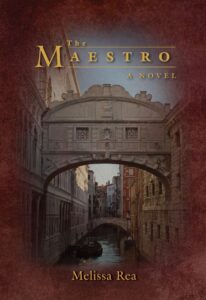How would you feel if you were scheduled to be hung on the gallows a day before you turned nineteen in 1718? In Melissa Rea’s book Maestro, we get the rare opportunity of seeing through the eyes of someone (Gabriella) who experiences just that. Prepare to be pulled into the classical world of 18th-century Venice, Italy, with Maestro’s romantic and historical plot.
Maestro by Rea offers a unique take on romantic and historical fiction by having Gabriella (the main character) tell her story of innocence in front of a growing crowd as she awaits her execution. As you read through this brilliant publication’s pages, it’ll feel like you are a part of the crowd Gabriella is addressing. Thanks to the author’s impressive storytelling prowess, you will undoubtedly be invested in her story.
With that said, join me as I introduce more parts of the book to catch your attention enough that you’ll read it. I promise I will not spoil too many details!
What is Maestro’s Premise All About?
The story of Maestro is set in 1718 at the special convent school of Ospedale della Pieta in Venice, Italy. It revolves around the main character, Maria Gabriella Constanzi, also known as “Gabriella” for short. At the very start, you’ll find her standing on top of a “stage” that people don’t usually use to tell their life’s story — that stage being the gallows. Gabriella is scheduled to be hanged a day before her nineteenth birthday.
Ultimately, she finds herself recalling her life in front of an unconventional audience who came to witness a macabre show. And as she spills her heart out to strangers, she wonders how differently everything could have turned out. If she hadn’t been impregnated and exiled to the convent school she was now in, if she hadn’t listened to and allowed her carnal desires to possess her, would her feet be standing on the rough and splinter-riddled surface of the gallows?
Gabriella’s “what ifs” can’t honestly be answered, but readers can see how things could’ve been as they read her words. One can even argue that if she realized or someone told her, “All you need is love!” Then she wouldn’t have let her sensual takeover.
What Readers Can Expect in Maestro‘s Romantic and Historical Plot
Maestro by Rea (that’s me!) is a novel that readers will find unique. Through dialogue, people will be led by the hand and taken on a fantastic journey through Gabriella’s life. Growing up in a dignified life, being the daughter of the Count and Countess of Pompeii, it’s normal to think that she would’ve led a straight and narrow life.
However, as a teenager who is curious about the burning desire rising from the pit of her stomach as her senses are flooded by pleasure, she is bound to make foolish choices. Gabriella eventually disgraced herself and her family because she got pregnant by another man, even though her hand had already been given to an arranged marriage. Throughout the book, you might be critical of Gabriella and her actions.
But your harsh opinions could change as you continue to read and listen to her story. You’ll start to sympathize with her and see that she’s had a rough relationship with bad luck for several years, even at a young age. Also, the other characters have been developed properly, helping to tell the story of Gabriella.
Is it Worth a Read?
Of course, the final say if Maestro‘s romantic and historical plot is worth a read would be up to the individual readers. But many people have given their reviews and said some nice things. One even said, “‘Maestro‘ is a sensual feast and gets 4.8 stars from me.”
And even though historical romance might not be your cup of tea, the storytelling I incorporated in the book will keep you engaged. I urge everybody to try it and be the personal judge if it is worth a read or not.
I am proud and happy of Maestro and the story of Gabriella — a woman burdened by heavy consequences from her actions. Maestro by Rea (that’s me, again!) is an excellent combination of history, mystery, suspense, and romance for readers. And before I leave you, I’d like to ask one thing:
How would you feel if you were scheduled to be hung on the gallows a day before you turned nineteen in 1718?
